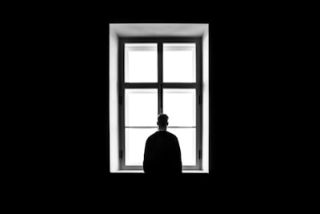Loneliness
Lonely, but Still Likable
There is no reason to be ashamed; we all feel lonely sometimes.
Posted March 28, 2024 Reviewed by Ray Parker
Key points
- Loneliness is common and can be worsened by shame.
- Loneliness isn't about how many people you know but how close you feel to them.
- Taking action combats loneliness, such as engaging in activities that connect you with people.

More than 44 million American adults say they experience “significant loneliness” sometimes daily, according to a Gallup panel survey taken last year.
According to a study led by psychologist Manuela Barreto, often those feelings come with shame, which makes it harder to cope because people are less likely to reach out, disclose their feelings, and have the confidence to connect with others.
According to research, what we believe about loneliness impacts how we experience it.
Those who believe their loneliness is the result of a personality flaw, some unworthiness or character fault, or unlikability feel the pain more acutely.
Those who believe loneliness is a condition that they can change or influence are less likely to feel ashamed and experience less loneliness.
The Emergence of Lonely Feelings
While many say the stigma of loneliness—the embarrassment of feeling like others don't like them—contributes to their shame, loneliness is a universal emotion felt by nearly everyone at different times, even those in relationships. Negative feelings can even be adaptive, prompting people to initiate more meaningful connections that support health.
Loneliness stalks us throughout our lives when we feel physically isolated from others or feel as though we don’t matter. It also comes on hard when we don’t feel like our friends are supporting us in the ways we want or expect. Or in the ways we think we would support them.
It has little to do with how many people you know, it’s more about the quality of the connections that you do have. It’s possible to be married, surrounded by friends at work, and popular at a party and still be lonely if you feel that the quality of your relationship is poor.
And those feelings can make us sick. Persistent feelings of loneliness contribute to declines in cardiovascular and cognitive health and lower our immunity. Strong social connections boost our happiness, well-being, and mental and physical health.
Are You Likable?
Yes, yes, yes you are. Whether you believe it or not is a whole other deal. Research indicates that people regularly underestimate how likable they are.
This “liking gap,” as it’s sometimes called, can lead to loneliness by causing people to avoid social interactions. If you believe you won’t be received, or even worse, that you’ll be rejected, then you aren’t likely to show up and participate.
While external factors like income—people living in low-income households are loneliest, according to Gallup—environment, our health, where we work, and other variables influence how socially connected and supported we are.
But how lonely we are also depends on us. We can ease those lonely feelings by showing up and engaging in activities with others.
Breaching the Loneliness
First, acknowledge loneliness is part of life. You're bound to feel it.
When you do—pause—recognize the feelings. Then, take action. Make a call. Check-in on a friend. Extend an invitation. Or get out in the world. Even a short message or a thinking-of-you call can ease your lonely feelings and are much more appreciated by others than you would ever expect, according to Peggy Liu, a researcher and an associate professor at the University of Pittsburgh.
Those short interactions remind us we are not alone. We do matter and can make a valuable contribution.
Drop the Expectations
Expecting others to behave a certain way—or the way we would—is unfair to them and causes more pain for us. Instead, recognize their unique gifts and the things you appreciate about the friendship. If you can’t come up with anything, well, maybe it’s time to find some new friends.
Friendship Takes Effort
Deeper connections develop over time, but even casual interactions can help us feel more engaged in the world, so put yourself where there are other people.
Studies show that older people who volunteer experience fewer feelings of loneliness. People of all ages benefit from doing good deeds and participating in hobbies or activities that they enjoy or want to learn about. Volunteering is also a good way to meet others who share those interests.
Take a class, join a gym, or attend a book club at the library. Follow your interests, and you will run into others who share your interests.
Recognize that solitude and alone time is also healthy. But when it starts feeling unwelcome, that's a good time to reach out and look for ways to connect.
Authentic connection takes time to develop, so be patient. Just by showing up, you are taking care of yourself and building a foundation that can help ease those lonely feelings in the future.




